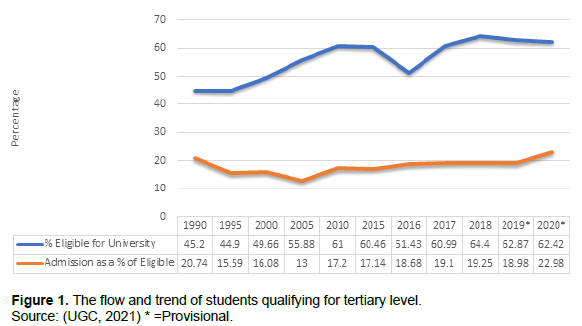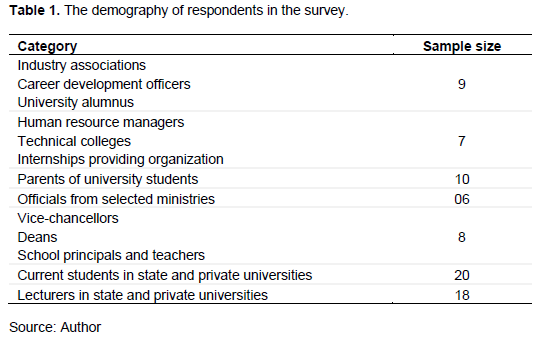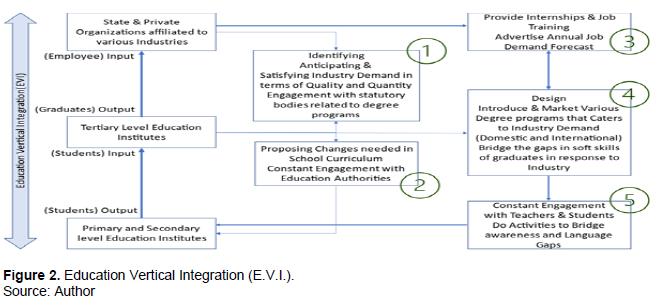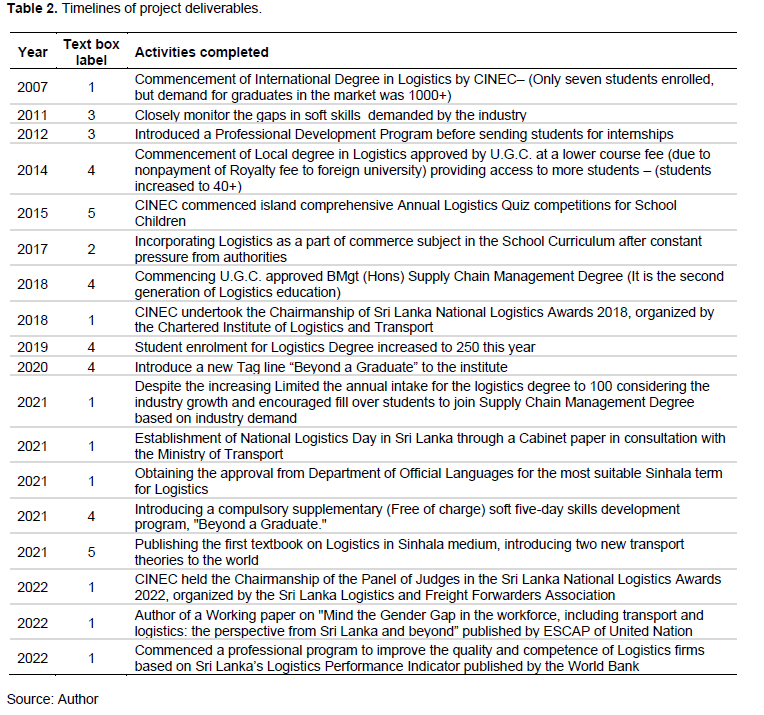Full Length Research Paper
ABSTRACT
Tertiary education is a turning point in anybody's life. Students' choice of tertiary education is crucial for them, their family members, and the country. All parents would like to see their children reach the heights in education and develop many career prospects. In Sri Lanka, critical job profiles are limited to medical doctors, engineers, accountants, and lawyers. However, the fact remains that this type of lean job market is not realistic or sustainable. Firstly, a country needs not have many professionals from a handful of fields. Secondly, not all students have the capacity to complete the coursework of their respective programs. On the other hand, many vacancies in different fields must be filled consistently, and a country cannot be sustained otherwise. Making a shift in students’ psychological paradigm is essential in this scenario. This paper introduces a new concept called vertical education integration (E.V.I.). E.V.I. provides a strategic solution to bridge various gaps in the current education system. This concept has been tested and proved for successful results in Sri Lanka.
Key words: Education, Industry, University, School.
INTRODUCTION
Unemployment is a severe issue in any country, and graduate unemployment or underemployment has been an issue in Sri Lanka for several decades (Gunaratne et al., 2018). Education vertical integration (E.V.I.) refers to integrating the education process from primary education leading to the industry affiliation via the university system. It is the comprehensive application of the services marketing concept in the education system. In other words, tertiary education institutes need to supply the graduates demanded by the industry. For example, marketing refers to identifying, satisfying, and anticipating customers' needs and wants at a profit, better than their competitors, in a socially responsible manner through a holistic approach. In this case, the "customers" denotes various industries that provide jobs to graduates. Accordingly, tertiary-level education providers should identify, anticipate, and satisfy the present and future demands in the job market. However, it is realized that a conflict arises when the specific degree programs that are newly introduced are based on anticipated futuristic demand by the industry. Since the students at the tertiary level are not interested in following such modern degrees, they consider it as risking their career by entering a new academic/professional territory. As a result, the supply of graduates is never compatible with the industry demand. This mismatch results in waste of human resources, non-return on investment in education, and social unhappiness. For example, students enter government universities after a highly competitive selection process due to inadequate resources to accommodate those who obtain minimum entry qualifications in Sri Lanka. It is regrettable if they are compelled to be unemployed due to a mismatch of employers' perspectives in the modern world. This happens due to a mismatch of job opportunities against the skills and competence they developed in tertiary education. The time spent by students and the money spent by the government on providing free education will become a waste. In countries like Sri Lanka, instruction is offered free to students/parents. It is an investment that a government expects a return on it after graduation, but when graduates are unemployed, return on investment is not achieved. This impacts the country's economy as well as at the family or individual level (Gunaratne et al., 2018). It is therefore vital to develop a mechanism to overcome this issue. The solution should lead to a psychological paradigm shift in students' demand and enrolment for various academic disciplines in tertiary education. To make this exercise meaningful, the universities must conduct degree programs that cater to the need of employers and are on par with the perspectives in the modern world. For example, there are clear doubts that the learning of degree programs conducted in government universities cater to the demands of the commercial world in the present context. It is encouraging to note the contribution from the non-state higher education institute is emerging. These institutions will react to the demand immediately due to faster decision-making in the private sector. These institutes may cater to the new paradigm provided the right message about changing the job market is conveyed to students and parents. This paper discusses the essential nature of vertical education integration (E.V.I.) to create a paradigm shift in students' Choices in the value chain of a modern higher education institute in Sri Lanka.
LITERATURE REVIEW
Tertiary education usually refers to all formal post-secondary education. This may include the education provided by public and private universities, colleges, technical training institutes, and vocational schools (World Bank, 2021). Students are not passive: they are ‘blurring’ the boundaries partly to better situate themselves with respect to employment prospects and adult life (Whitman, 2003). Usually, the education value chain refers to a network of activities centered on teaching, research, and community service functions. Post-secondary education is a crucial point for students as it usually defines the destiny of becoming an industry professional or an entrepreneur (Edirisinghe et al., 2022). Parents play a significant role in primary and secondary education in Sri Lanka. In tertiary education, students are flexible in selecting the academic path they wish to take depending on their past academic achievements. From the perspectives of state universities and non-state higher education institutes, involvement in educational design, educational delivery, assessment, research and development, and outreach activities are crucial in the education value chain. The value-driving activities for higher education include student enrolment, research grants and publications, teaching and learning training, research training and development services, technology, student evaluation of teaching, and visibility (Dorri, Yarmohammadian, & Nadi, 2012). This paper focuses on how the vertical education integration could lead to a psychological paradigm Shift in students’ choice in tertiary education. A paradigm shift is a significant shift in how something works or is completed regarding conceptions and practices (Edirisinghe et al., 2022). A student's preference to follow a specific degree choice may depend on the type of employment they prefer to enter after graduation. A rapid growth in the enrolment of tertiary-level education is evident in developing countries (Salmi and Bassett, 2014). In Sri Lanka, the highest student enrolment is evident in the arts faculties. To prove the mismatch, the unemployment rate among the performing arts and arts graduates has been cited in recent research. It is noted that the unemployment rate of performing arts and arts graduates stands at 57.1 and 50.4%, respectively. According to some research, the third-largest unemployment rate is shown under management graduates, who are 27.7% (Gunaratne et al., 2018). However, education is a non-utility function to the students, and tertiary education should not only focus on the skills and abilities of the grandaunts. It is paramount to focus on how the students feel about the educational experience that attracts them to make a choice logically (Abdullah, 2006). In some countries, tertiary education has been highly commercialized. There is severe competition among these institutes, and they always tend to cater to students' existing demands rather than developing degree programs in new academic disciplines. According to the results, the customer-oriented higher education system is accepted based on the quality of tertiary education. Further, it was highlighted that the corporate strategy should come from consumer needs. Regarding marketing in education, the term "Customer" is different from other sectors. The customer includes both parents and students. The consumer is not the customer in most cases. For example, the parents pay the expenses on behalf of tertiary education in Sri Lanka in most cases. Therefore, it is not only the students’ choice always. Many factors could influence the students' choices in tertiary education. Six dimensions to measure the quality of tertiary education, namely, non-academic aspects, academic aspects, reputation, access, program issues and understanding, and student perception were identified as a sixth dimension (SALMI, 2003). This study highlighted that the government of a country should assist their tertiary education institutions in increasing innovation and high responsiveness to the requirements of global education markets. Tertiary education benefits society in terms of long-term returns from basic research, new technology applications, and social cohesion. As per the results, many tertiary education institutions have produced a wide variety of choices for students who could pay and those who were eligible to borrow while promoting government universities to innovate and modernize. Also, public tertiary institutions make a great effort to provide responsiveness to the changes in training requirements of employers and develop the educational demands of students, which will contribute to having a productive labor force. Also, Salmi (2003) highlighted that globalization and the borderless higher education systems in the world had become an important question affecting tertiary education. The gender imbalance is also evident in specific education sectors due to lesser female participation in some jobs. Seafaring is generally perceived for males rather than females. According to the Tracer report (Gunaratne et al., 2018), there are two significant issues in the higher education sector in Sri Lanka. Firstly, failure to create sufficient opportunities to cater to the demand for tertiary education; secondly, the quality of graduates produced by the system varies across disciplines. This problem is seen even among universities. This factor intensifies the level of graduate unemployment. Generally, Students select the academic field based on their knowledge and the advice of parents, siblings, teachers, and peers. Sometimes, the culture in the secondary level education may influence that decision. In Sri Lanka, the decision-making flow of degree program selection has two thresholds. Primarily, students should obtain at least a simple pass grade in three subjects at their selected academic stream's G.C.E. (Advanced Level) examination. Also, they need a minimum mark of 30% for the typical general test. However, all students that reach this threshold cannot enter a government university due to resource constraints in the state sector. The University Grants Commission of Sri Lanka selects students with the highest "Z score" obtained in the G.C.E. (Advanced Level) examination depending on the slots available in the state universities in the respective year. Figure 1 illustrates the filtration rate from the university qualifying examination (G.C.E. Advanced Level) to the actual university entry in Sri Lanka according to University Grants Commission (U.G.C.).

It is clear from the above statistics that approximately 80% of those qualified to enroll for a university degree failed to find a placement in a state university every year. Those who find a post must settle only for the academic degree assigned to them based on their Z score. This choice is limited to the slots available in state universities under each educational program. Therefore, students' choice is immaterial for the top 20% of students who perform better in the university entry examination. However, the rest of the students may enroll in various degree programs offered by non-state higher education institutes in Sri Lanka, or they opt to migrate to follow a degree in a foreign university. These students have a more excellent choice, but it is noted in the current scenario that the selection is limited to a few essential degrees popular in society. For example, the parents, students, and even teachers always admire to qualify to become a medical doctor, engineer, lawyer, or accountant. However, this cannot be done by the higher education institutes alone. The students' choice is usually based on their predisposition about their academic/ professional destiny and cannot be suddenly changed. It is essentially influenced by the culture and family background etc. Therefore, a tertiary-level education paradigm shift is essential to address this issue. It needs the combined efforts of all stakeholders in the education value chain.
RESEARCH METHODOLOGY
The approach of this paper is tri-faceted, given the complicated nature of the topic. It is predominantly qualitative research that combines a case study, opinion survey, and desk research. The concept of E.V.I. covers three main stages, from the schools to universities to the industry, there is a wide range of stakeholders. Therefore, The target population of this study consisted, of a broad spectrum of audiences. To cover the industry perspectives, top officers of industry associations, career development units of higher education institutes, and representatives from university alumni were interviewed. A cross-section including managers in the human resources department in private and public sector organizations, managers of technical colleges, managers of companies that provide internships to students, and parents of university students (state and Private universities) were interviewed. In addition, carefully selected officials in leading ministries such as the Ministry of education, Ministry of Skills Development and Vocational Training, Ministry of shipping and ports, and Ministry of Finance were interviewed. As the critical stakeholders in tertiary education, vice-chancellors, deans of various faculties in private and government universities, school principals, and teachers were interviewed. It was revealed in the exploratory study that apart from the parents and siblings, the schoolteachers are usually consulted by students in their selection of academic streams. Current students in state and private universities covering various academic disciplines and lecturers in state and private universities were also interviewed. Accordingly, a convenient sample of seventy-eight respondents representing all stakeholders of the E.V.I. as per Table 1 was consulted. This is the sample chosen as a matter of judgment. Most were conducted as interactive zoom meetings, WhatsApp, and telephone conversations. However, the ministry secretaries were contacted through physical means. The discussions were interactive, informal, and non-time bound, and the data collection process was nonlinear and iterative. A single researcher collected data to avoid the subjectivity of forming and interpreting the raw data. However, the time of data collection was extended significantly to ensure the quality of the data. Accordingly, data collection by one person for the research was not detrimental to achieving the study's objectives. The narrative analysis method was used to administer and reformulate ideas presented by the respondents. It was not easy to find correlations or differentiate between each respondent of each response. Therefore, the standard methodology of developing coding and identifying themes, patterns, and relationships was skipped in the data analysis. It was limited to revising primary data by researchers and summarizing them into relevant categories. However, more time was involved in debriefing and discussing between other researchers about the data collected through voice recording; thus, the transformation of raw data into critical information was done through a collective approach and consensus. Statistics about education and global trends in reports published by the International Bank for Reconstruction and Development, The World Bank, and the United Nations Educational, Scientific, and Cultural organization were studied. Also, various domestic reports of the Department of Census and Statistics, University Grants Commission, Central Bank of Sri Lanka, Ministry of Education, and Department of Examinations were referred for more clarity on the input given by respondents. A case study was done in a leading maritime training education in Sri Lanka to understand E.V.I's reality better.

DISCUSSION
Education leads to knowledge acquisition and development of skills. Universities should know the destination of graduates after their formal studies at the university (Gunaratne et al., 2018). There are government universities/institutes that are established and come under the purview of the University Grants Commission (U.G.C.). Under the Universities Act, there are three categories: Universities, Institutes, and Campuses. Private-sector education has been in operation for over two decades. They offer degrees approved by the Ministry of education. Private higher education institutes also offer degrees accredited by various foreign universities. The fundamental challenge faced by students in Sri Lanka is government universities' lack of infrastructure capacity. Annually, 180,000 students lose the opportunity to obtain the free university education provided by the government. Even after graduating, these candidates suffer due to unemployment and underemployment. It was reported that only 65.5% were employed by those who graduated from state universities in Sri Lanka. 32.2% were unemployed, and 2.4% were engaged as volunteers (Gunaratne et al., 2018). Those who could not join the government universities may seek opportunities in private sector higher education institutes. However, if the students still prefer to follow the similar degree programs conducted by the government universities, the same disparity between unemployment and underemployment will continue. Sri Lankan students seek migration to enhance their employment prospects (D’Souza and Moore, 2017). Focus on degree programs that have more job opportunities in the current global trend, such as Science, Technology, Engineering, and Math (STEM) education programs. To drive future economic growth, more focused degree programs are required (AHEAD, 2018). Considering the above background of tertiary education in Sri Lanka, the higher unemployment rate of graduates is not only a problem for them but also for others who sacrificed their future in this tough competition. It is a problem for those who pay taxes, making it possible for a government to provide free education in the universities. It is a problem for their parents and other family members who contributed significantly to their lives, making them graduates. Consequently, those who have the money go overseas for higher education. They earn their tertiary education using the country's valuable foreign exchange, which is hard-earned through exports and other sources. Unfortunately, many of them do not return to Sri Lanka after qualifying. This is another significant loss to the country in terms of economy, and their parents lose their association forever.
Case Study
The case study was conducted in Sri Lanka. Tertiary education in Sri Lanka has a crucial challenge. 85% of candidates are left behind from the formal tertiary education as only 15% would be accounted to enter the university system due to infrastructure incapability (Ranwala et al., 2020). Education vertical integration (E.V.I.) is a novel concept introduced in Sri Lanka. This concept has been proposed to the Ministry of Education as a policy proposal by a leading tertiary education institute, namely, CINEC Campus. The policy proposal was presented in 2020, among other things. However, the actions about the first project for Logistics education have been progressing since 2015 and will be completed in 2021. The second E.V.I. project targeting the Tourism and Hospitality sector is currently in progress. There are a few other policy concerns also relevant to tertiary education. It proposes a revision to the selection criteria for state university entrance. To expand the horizon for future students, it is suggested to introduce new academic disciplines in the school curriculum, either in secondary or tertiary education. Teaching technical and vocational education is encouraged at the tertiary level. Finally, it proposes to recognize and appreciate children with different skills formally. This will help and guide them to reach heights where they can perform well. In Sri Lanka, non-state universities usually enrol students who are deprived of the free education at state universities. This case study explains how this institute has implemented the E.V.I. for the Logistics degree program. The timelines and activities of the five text boxes indicated in Figure 2 are given in Table 2. The outcome of this approach is fascinating. Industry players continue to absorb all graduates from the internship stage, and students end up in high-paying local and foreign jobs. The employability rate of graduates stands at 100%. This institute is conducting BMgt. (Hons) Tourism and Hospitality Management degree approved by the University Grants Commission/Ministry of Higher Education, focusing on the future demand in the trade. After completing the first E.V.I. project, they are currently engaged in the second project called E.V.I. of the Tourism Industry. This institute is also involved in another project under the World Bank research grant called "Development of a mechanism that leads to a psychological paradigm shift in students' demand and enrolment for various academic disciplines in the tertiary education in Sri Lanka." Currently, this institute is developing an online tool to evaluate various options by students before selecting their education path. It was noted that they would use algorithms to carry out a comprehensive SWOT (strengths, weaknesses, opportunities, and threats) analysis to determine the best choice of academic stream out of many options.


CONCLUSION
This paper suggests E.V.I. as a timely solution for any country to bridge the gaps in demand and supply in current global trends. The traditional job markets are now redundant with the rapid development of technology. The concept of E.V.I. would play a significant role in this scenario, considering the above background. The vertical integration of education can be illustrated in Figure 2. According to various activities highlighted in Figure 2, the E.V.I. is a circular process. Students in the primary and secondary levels need to be transformed so that they ultimately cater to the jobs available/demanded in the local and international markets. However, given the social and cultural norms and ideologies in a country this is easier said than done. It was also realized that there is no standard system for students to make a learned decision about the best choice for their academic or professional destiny. Ideally, the student should self-evaluate their strengths and weaknesses. After that, the results must be mapped with opportunities and threats in the respective industry/market. This process is partly equal to a psychometric test. Psychometric tests primarily measure an individual's mental capabilities and behavior. However, this SWOT (Strength, Weaknesses, Opportunities, and Threats) analysis needs to examine the conditions beyond a psychometric test. Apart from evaluating a person’s overall suitability for a particular role based on performance, personality characteristics and aptitude/ cognitive ability, this factor is usually tested in a psychometric test. The proposed situational analysis needs to forecast industrial development, business trends, technology development, etc. In other words, the output of the proposed test needs to direct the student about the most suitable career.
ACKNOWLEDGMENT
The authors wish to acknowledge the funding of this research by the World Bank under the Accelerating Higher Education Expansion and Development (AHEAD) project.
CONFLICT OF INTERESTS
The authors have not declared any conflict of interests.
REFERENCES
|
Abdullah F (2006). The development of HEdPERF: a new measuring instrument of service quality for the higher education sector. International Journal of Consumer Studies 30(6):569-581. |
|
|
AHEAD (2018). Development Oriented Research Grants (DOR Grants) Guidelines for Proposal Submission. Colombo: Ministry of Higher Education and Highways University Grants Commission. |
|
|
D'Souza J, Moore T (2017). Education in Sri Lanka. Retrieved 07 27, 2019, from |
|
|
Dorri M, Yarmohammadian M, Nadi M (2012). A review on value chain in higher education. Procedia-Social and Behavioral Sciences 46:3842-3846. |
|
|
Edirisinghe L, Siddhisena K, Siriwardena S, Ranwala L (2022). Creating a Psychological Paradigm Shift in Students' Choice for Tertiary Education in Sri Lanka: The Influence of Socioeconomic Factors. International Journal of Educational Administration and Policy Studies 14(1):1-16. |
|
|
Edirisinghe L, Siriwardane S, Ranwala L (2022). Significance of Blooms Taxonomy in Tartary Education; A Case Study in the Maritime. Sustainable Development Research 4(1):12-19. |
|
|
Gunaratne P, Ramanayake A, Panagoda D (2018). Tracer Study of Graduates Universities in Sri Lanka. Colombo: University Grants Commission. |
|
|
Ranwala L, Siriwardena S, Kurukulaarchchi V, Edirisinghe L (2020). Determinants of University Choice for the Academic Disciplines in the Tertiary Education in Sri Lanka. Colombo: Global Academic Research Institute. Gari Winter Multidisciplinary Symposium 2020 On 17th December 2020 @ Galle Face Hotel, Colombo, Sri Lanka, Available at SSRN: |
|
|
Salmi J, Bassett MR (2014). The equity imperative in tertiary education: Promoting fairness and efficiency. Springer pp. 361-377. |
|
|
Salmi J (2003). Constructing Knowledge Societies: New Challenges for tertiary education. Higher Education in Europe 28(1):65-69. |
|
|
UGC (2021). Retrieved from University Grants Commission: |
|
|
Whitman I (2003). Tertiary Education Policy in OECD Countries: developing the human resource. European journal of education 38(2):191-198. |
|
|
World Bank (2021). Higher Education. Available at: |
|
Copyright © 2024 Author(s) retain the copyright of this article.
This article is published under the terms of the Creative Commons Attribution License 4.0